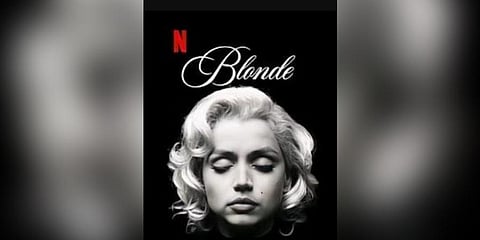

Blonde is a fictionalised account of Norma Jeane, a white girl from California, who goes on to become a Hollywood sensation under the pseudonym, Marilyn Monroe. Played by Ana de Armas, Jeane’s character continues to remain a hot topic of speculation within American pop culture since the 1950s.
An adaptation of Joyce Carol Oates’s 2000 Pulitzer-nominated novel of the same name, Blonde begins with a quick portrayal of Monroe’s violent and lonely childhood and then zooms in on her rise to become the ‘sexpot’ of Hollywood.
With a stellar cast comprising Julianne Nicholson as Jeane’s mother, Bobby Cannavale as Joe DiMaggio, Xavier Samuel as Cass, and Adrien Body as Arthur Miller, the performances keep the viewer hooked. Armas as Monroe, in particular, is evocative and entrancing. The camerawork too is deft and aesthetic. The frames flitting between black and white, and colour, capture poignantly the conflict between the personalities of Jeane and Monroe, as she struggles to find a place and voice of her own in a world ruled by men.
At the heart of it, Andrew Dominik’s depiction of Jeane seems to harp on the human need to seek familial love and protection, but the fictionalised tale ends up being nothing more than a misogynistic portrayal of a female Hollywood star. The director uses tropes of rape, sexual exploitation, assault, violence, horrors of abortion repeatedly to reduce Jeane’s life to a flat tragedy that lacks vulnerability.
She comes across as an anti-abortionist, and the reproduction of the popular conception of Monroe as a sex symbol does nothing to advance the story of Jeane that gets lost in this fictionalisation told with an undeniable male gaze.
The treatment of the men in the film too is linear and unimpressive. From Monroe’s father who abandoned his family, to her first love Eddy, both her husbands, and her managers who molested her, and American president John F Kennedy––almost every man is shown as an antagonist.
Monroe and her biographers, over the years, have refused to believe in the black-and-white nature of her relations with men, but Dominik’s adaptation does exactly that, while also reinforcing the actor’s image as the ‘dumb blonde’, something it was expected to undo. Even as the performances make Blonde a bearable watch, Monroe’s life continues to be a mystery, with this much-awaited film failing to deliver a fitting end to decade-old rumours and speculation. What it does do, however, is serve as yet another reminder for writers and filmmakers to cater more to the nuances of their characters than just the voyeuristic eyes of the audience.